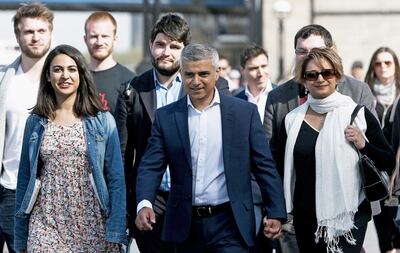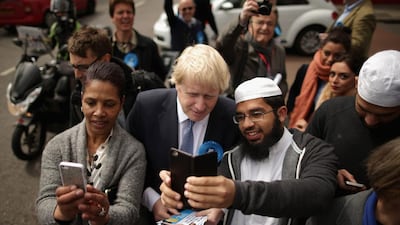There is something rather eerie about seeing a review into Islamophobia in the UK's ruling Conservative party, followed by an example of complicity by the British prime minister. But that is what happened when Boris Johnson hosted Viktor Orban, the Prime Minister of Hungary, in London last month.
It makes a postmortem of the actual report even more ironic to carry out; but Islamophobia, and the toleration of it at the highest levels of the British establishment, remains one of the greatest tests for the soul of the Conservative party. The sad reality may be, however, that the party does not care about failing that test.
On May 25, an inquiry ordered by the Tories criticised the party, led by Mr Johnson, for failing to adequately investigate accusations of bigotry within the establishment, with some two-thirds of those complaints relating to anti-Muslim sentiment.
The inquiry was completed months ago, sparking speculation that it had been held back in order to avoid negative publicity before the local UK elections held in May.
Though ordered by Mr Johnson himself, the inquiry criticised the Prime Minister for his own comments pertaining to Muslims. The inquiry is said to indict the lack of seriousness involved in the Conservative party's approach to dealing with complaints around alleged discrimination – and particularly with regards to Muslims.
Uncomfortably for the party, however, senior Muslim Conservatives, such as Sajjad Karim, a former Conservative member of the European Parliament, and Sayeeda Warsi, a Conservative member of the House of Lords, were less than enthusiastic about lauding the report’s findings.
Mr Karim described the inquiry as “nothing but an attempt to whitewash deep-rooted issues out of sight". It is not surprising that he would see it that way; the inquiry failed to hold the Conservative party to account for systemic problems of discrimination, and instead narrowly defined the issues.
The original call for an inquiry into Islamophobia in the party, as per an election pledge by Mr Johnson, had been swept away and refocused on to all forms of discrimination instead, despite widespread concerns about specifically the issue of Islamophobia in the party.
As a result, the inquiry could distance the Conservatives from the specific accusations on one hand, and sidestep any in-depth examination pertaining to Islamophobia on the other. And as the inquiry’s mandate was set up by the party itself, it was able to define the parameters of its own investigation – which protected it from the most damning conclusions – that the party’s issues on Islamophobia permeate throughout.

Whether it is Mr Johnson's own statements in a newspaper column he wrote in 2018 calling Muslim women who wear the face-veil, "letterboxes", or the Conservative party's mayoral candidate for London, Zac Goldsmith, accusing the current Mayor of London, Sadiq Khan, of links to radical extremists, it is clear: the Tories have a specific problem to address when it comes to Islamophobia.
Be that as it may, the cochairwoman, Amanda Milling, said they would "like to apologise to anyone who has been hurt by discriminatory behaviour of others or failed by [the Conservative party’s] system".
Ms Warsi said this constituted "an acknowledgement of racism and systematic failure". But neither the inquiry nor the party accepted that the party’s issues were evidence of institutional discrimination against Muslims, despite the mass amounts of complaints, resulting in calls for the Equality and Human Rights Commission, Great Britain’s national equality body, to conduct an independent inquiry.

Perhaps rubbing salt into the wound, a few days later, Mr Orban, who has been accused of peddling anti-Semitic tropes and Islamophobia, was feted in Downing Street. While Mr Orban's views are perhaps the most blatant example of the anti-Muslim extremism being mainstreamed in Europe, he is by no means the only one.
In France, for example, the constitutional principle of secularism or "laicite" has been "weaponised", in the words of French legal scholar Rim-Sarah Alouane, in a way that is deliberately focused on problematising Muslims for simply being Muslim.
There are now scores of academic studies, including those published by the multinational Grease consortium, funded by the European Commission, raising concerns about how widespread the sentiments of the far-right are in mainstream political life and the problem is worsening.
It is why the Conservative party’s report is so symbolic. It at least tacitly admits that there is a problem at the highest levels. But it was a missed opportunity. Instead of recognising the scale of the problem, it attempted to control criticism of the problem. Such half measures will do nothing to combat bigotry in our societies; they will only serve to allow it to come in with more strength through the backdoor.
Dr HA Hellyer, a Carnegie Endowment scholar, is a senior fellow at the Royal United Services Institute and Cambridge University


